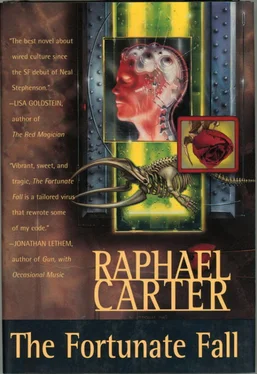Raphael Carter - The Fortunate Fall
Здесь есть возможность читать онлайн «Raphael Carter - The Fortunate Fall» весь текст электронной книги совершенно бесплатно (целиком полную версию без сокращений). В некоторых случаях можно слушать аудио, скачать через торрент в формате fb2 и присутствует краткое содержание. Город: New York, Год выпуска: 1996, ISBN: 1996, Издательство: Tor Books, Жанр: Киберпанк, на английском языке. Описание произведения, (предисловие) а так же отзывы посетителей доступны на портале библиотеки ЛибКат.
- Название:The Fortunate Fall
- Автор:
- Издательство:Tor Books
- Жанр:
- Год:1996
- Город:New York
- ISBN:0-312-86034-X
- Рейтинг книги:3 / 5. Голосов: 1
-
Избранное:Добавить в избранное
- Отзывы:
-
Ваша оценка:
- 60
- 1
- 2
- 3
- 4
- 5
The Fortunate Fall: краткое содержание, описание и аннотация
Предлагаем к чтению аннотацию, описание, краткое содержание или предисловие (зависит от того, что написал сам автор книги «The Fortunate Fall»). Если вы не нашли необходимую информацию о книге — напишите в комментариях, мы постараемся отыскать её.
“Gripping…. One of the most promising SF debuts in recent years”.
—“Publisher’s Weekly” starred review
The Fortunate Fall — читать онлайн бесплатно полную книгу (весь текст) целиком
Ниже представлен текст книги, разбитый по страницам. Система сохранения места последней прочитанной страницы, позволяет с удобством читать онлайн бесплатно книгу «The Fortunate Fall», без необходимости каждый раз заново искать на чём Вы остановились. Поставьте закладку, и сможете в любой момент перейти на страницу, на которой закончили чтение.
Интервал:
Закладка:
“All right,” I said grudgingly. “In for a penny, in for a pound.”
“That’s the spirit,” Voskresenye said brightly. “Nothing like a good cliché to help you to a wise decision.”
As I opened my mouth to answer, I heard a siren behind us. “Oh, God. Please tell me that’s an ambulance,” I said feebly.
“No. It’s a yellow-and-black,” he said. “Turn your head, as though you were looking for a place to pull over.”
“I hope you’ve got a backup plan,” I whispered, complying.
“That’s not for us. He’s chasing a speeder or something.”
“Look,” I said, “you’re wanted, you were seen, I was heard calling your name, now a Postcop comes out of nowhere. It stands to reason she’s looking for us.”
“Listen.” The wasp’s siren dopplered past, not even slowing. “You see? The Postcops are unimaginative, predictable, and overdependent on machines, but they are not stupid. In a matter of this importance they would not be so unsubtle as to send a wasp. If they come for us in a car, you may rest assured it will be unmarked and Net-silent.”
“How comforting.”
“You could not be safer than with me, Maya Tatyanichna,” he said with quiet amusement. “The Hanged Man is not in my cards. I am told to fear death by drowning, which has happened once already, and will happen once again—but not just yet.”
The traffic was now so thick that I had to devote all my attention to driving. At last, just a few blocks away from where we’d started, he silently pointed out a crowded parking lot. He had me park the car with its rear bumper to a wall, so the license plate would be hidden from the security camera.
“Our bubble is about a kilometer away,” he said. “I apologize for making you walk, but that way, if they do find the car—” he tapped its hood smartly, making the dashboard lights wink “—we’ll have some warning.”
As we walked I asked him what the terrorism charge on his record was for.
“The charge is actually ‘informational terrorism,’” he said.
“What?” I turned to face him, fear constricting my throat. “ Informational terrorism? That’s not a Postcop crime. That’s under Weaver jurisdiction.”
“It happened a long time ago,” he said. “The Weavers have long since forgotten.”
“Weavers don’t forget.”
“They most certainly do,” he said. “Unlike the Postcops, the Weavers are entirely rational; that is their only point of weakness. If they are confident that you cannot repeat your crime, they will not seek you out. You need only stay offline for some years, and you will be entirely gone from their minds.”
Should I believe that?
“Sure,” Keishi said. “A Weaver sees a healthy chunk of the whole Net every day; they can’t remember all of it. For most things they rely on sense and reflex, not on memory.”
“How did this charge come about?” I asked Voskresenye.
“Some decades ago,” he said, “I was involved with a group of dissident hackers who wrote a virus designed to seek out the computers of every financial and governmental agency in the FHN. Only computers, you understand, not minds—otherwise it would have been far harder to get past the Weavers. It hid there until a certain day, then encrypted every byte of data it could find and self-destructed, leaving a series of ransom demands behind it. In effect, we were holding the information hostage.”
Why doesn’t that sound right to me? I subvoked.
“Ask him how he put an unbreakable code in the space of a virus,” Keishi whispered in my ear. “A virus would have to be small, to get so widespread without being detected. You could fit in a key a few thousand bits long, maybe, but you put a couple of teraflops on that and it’ll crumble.”
I paused to reorganize the question in my mind, then repeated it to Voskresenye.
“Oh, it did crumble,” he said. “It crumbled very quickly. We were astonished to discover that in some places it had held out as long as forty minutes.”
“Then what good was it?”
He looked at me out of the corner of his eye, not moving his head—almost, I thought, as though he couldn’t. “You might better ask, what good would it be otherwise? Do you think the Weavers negotiate with terrorists? What concessions will they give as ransom? Would they not instead hunt us down and kill us, even if it took a thousand men to take each one? If we had succeeded, it would have sealed our fates—such a simple trick as temporary disappearance would never have thrown them off, if I had done enough damage for them to take me seriously.”
“So you failed deliberately?”
“We invented a false purpose, and deliberately failed in that, yes. This was to conceal our true purpose.”
“Which was?” I prompted.
“To build a network of back doors into the computers that we infected. We knew that when they decrypted the data, after such a short time, they would not bother to check that what they recovered was the same as what they had before—especially since they had intercepted several copies of the virus, and made sure that their only function was to encrypt. We had only to hope they would not find the few copies of the virus that were subtly different from the others; and they did not. So the programs they restored had points of entry that had not been there before.”
“These back doors—wouldn’t they have found them eventually?”
“Certainly. But they remained in place only a few weeks. They were only meant to provide us access to the lowest levels of the system, a toe in the door. From there we could strip away the root passwords, letter by letter and bit by bit. And once we had root access, we could create all the back doors we dared. In that way, and by not doing anything that would alarm the Weavers unduly, we’ve managed to keep one step ahead of them ever since. The descendants of those original back doors are still being maintained. That’s how we’re able to create the bubbles.”
“Who do you mean when you say ‘we’? The people involved in this virus project?”
“Their current equivalents. All the members of that team have long since been disappeared, and those that followed them, and those that followed the ones that followed. You can evade the Postcops a long time, and the Weavers a short time; but in the end, they always catch you.”
Keishi, crack the surveillance camera and give me a direct shot of his face, I subvocalized. I wanted to see his reaction to my next question. When the window opened up in the lower left-hand quadrant of my field of vision, I asked him: “You say a person can only evade the authorities a few years, yet you’ve apparently been doing it for decades. Why have you survived where so many others were caught?”
In the window he raised his eyebrows. “Why, skill, of course.” Then he laughed: “All right, then, good wiring.” And then the window closed and he said, “Off the record? A combination of abject cowardice and pure luck. But don’t let it get around.”
The window opened again on a face without expression, save perhaps a hint of mischief at the corners of the mouth.
Can he hear everything I say to you?
“Absolutely not,” she said. “He didn’t hear you ask me for that crack, he saw the crack. Your thoughts are cabled to me on quanta; if he looks at it, he changes it and I can tell. He can’t break that unless he can revoke the laws of physics. The very first leg of the trip is by radio, and that he could hack in theory, but it’s coded with megabit primes and not even he could break that. Besides, I’m keeping close tabs on what goes on inside that crummy little cranium, and if he tried to crack us open, I’d see it in a second. Believe me, Maya, he’s good, but I’m a whole lot better. And when I say we’re tight, we’re tight.”
Читать дальшеИнтервал:
Закладка:
Похожие книги на «The Fortunate Fall»
Представляем Вашему вниманию похожие книги на «The Fortunate Fall» списком для выбора. Мы отобрали схожую по названию и смыслу литературу в надежде предоставить читателям больше вариантов отыскать новые, интересные, ещё непрочитанные произведения.
Обсуждение, отзывы о книге «The Fortunate Fall» и просто собственные мнения читателей. Оставьте ваши комментарии, напишите, что Вы думаете о произведении, его смысле или главных героях. Укажите что конкретно понравилось, а что нет, и почему Вы так считаете.












